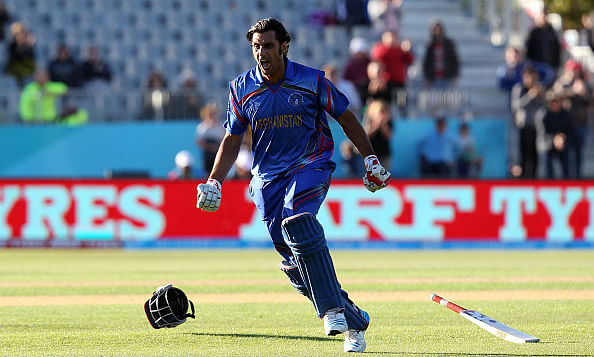
An incredible success story: The mighty Afghan roar

On February 26, people in Afghanisthan woke up to news of yet another sucide attack, reportedly targetting the NATO convoy in the capital city of Kabul. The news wasn’t unusual in the war ridden country. A few hours later, the Afghan flag was fying high in a faraway land, on a cricket ground, the University Oval in Dunedin, far away from the shambles of the country, where the team had just beaten Scotland in a Cricket World Cup.
Afghanistan middle order batsman, Shamiullah Shenwari was completely dejected after he was caught at deep midwicket in the 48th over of the match. Dejected because his team needed 19 of 19 with only one wicket. Dejected, as he hadn’t been able to clear the boundary for the fourth time in that over. Dejected, because he needed to be there and he couldn’t be there. He, an embodiment of dissapointment sat near the fence waiting for a miracle.
Thankfully, his efforts didn’t end in vain. The scotish bowler Iain Wardlaw ran in to bowl the third ball of the final over of the match with Afghanistan needing four runs to do what they had dreamt of for years. Afghanishtan’s tall fast bowler Shapoor Zadran swiped the ball past the short fine leg fielder and it raced past to the fence and the team recorded its first ever win at cricket’s biggest stage.
Defining moment in nation’s history
Zadran bent down on his knees with his arms streched and waved at the buch of people who had come to the Oval to support the team. The bunch of people that had witnessed what could be a defining moment in the history of the game, and definitely in the history of their country.
Shenwari was elated, as was the entire team. The fans were shouting themselves hoarse for ther team of ‘mighty Afghans’. It was as if the entire cricketing world was elated to see Afghanistan win.
The streets of Jalalabad, the cricketing capital of Afghanistan, saw fans go crazy. Similar scenes were flooding other parts of the country. People gathered around the Afghanistan Cricket board headquaters in Kabul to celbrate their heroes.Their boys, the ‘blue tigers’ made it possible – a day of national happiness amidst all the rubble from the blast and the countless other blasts that had preceeded it.
Celebratory gunfire wounded six people in Jalalabad, according to a health official in Nangarhar province.
The win against Scotland wasn’t an easy one. All the Afghanistan bowlers chipped in and Shapoor Zadran, before hitting the winning runs took four crucial Scotland wickets. The run chase was filled with drama. From 85-2, the team collapsed to 97-8. The nail biting chase went to the final over of the match, leaving fans on edge of their seats. The final scorecard read 211-9, making the chase one of the most memorable see saw rides in this World Cup so far.
Afghani cricket born in refugee camps
Given that the members of the squad started playing professional cricket only 20 years ago, the team’s climb up the ICC ladder is no little achievement, also considered that conditions at home are not conducive to the flourishing of a sport.
Refugee camps in Pakistan are widely believed to be the reason for the sport’s popularity in Afghanistan. Their captain Mohammed Nabi had practised the game at one such refugee camp in Pakistan, as would have a lot of his teammates.
The president of the Afghanistan Cricket board told Cricinfo’s assistant editor Siddharth Monga, “When you get on to a low flying aircraft in Afghanishtan, all you can see is cricket, different fields and there is just cricket happening everywhere.”
The people of Afghanistan have found new love in the gentemen’s game. The armed forces and the Taliban have reportedly celebrated the team’s victory by firing gun shots in the air. Cricket has proved to be the unifying factor in the country.
Their passion is evident in their team’s progress. The team has shown a lot of promise. Will the team be able to seal a quarter-final berth? It seems to be an almost impossible task for the ‘Blue Tigers.’
But as cricket writer Simon Barnes puts it, “if you are used to playing and training to the sound of occasional gunshots, you have a different view of impossible to the rest of us.”